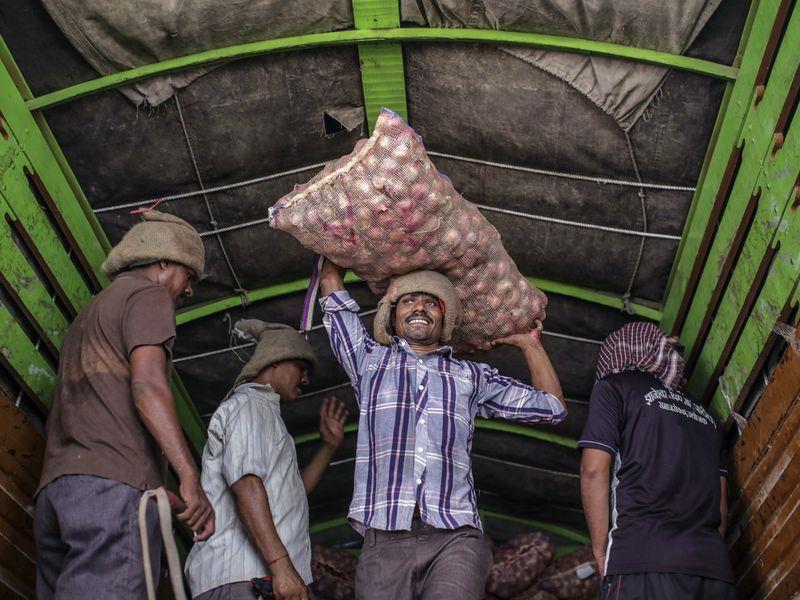It's getting more expensive to eat
Food prices are climbing fast in the world’s biggest emerging markets, posing a possible inflation threat after months of dormant pressures.
Asia’s two largest developing economies face a price surge for staple products – pork in China and onions in India – that are central to consumers’ diets.
In Turkey and Nigeria, supply problems are driving up costs, while United Nations data show global food prices rose at the fastest pace in October in more than two years.
While the spike is painful for poorer consumers, it hasn’t reached a level to convince central banks to pull the brake on policy easing, as they remain focused on boosting economic growth amid a global slowdown. Average inflation across emerging markets is still at an all-time low, according to a Bloomberg gauge of consumer price indexes.
“We think it’s likely they would look through food inflation that is concentrated on a handful of products and driven by idiosyncratic factors,“ said Taimur Baig, managing director and chief economist at DBS Bank Ltd. in Singapore. “Bias toward further monetary and fiscal easing will remain in 2020, in our view.”
PRICE SHOCK
Nevertheless, the threat of a price shock is real.
Nomura Holdings Inc. economists recently warned of three potential triggers of higher food costs – weather-related shocks, higher oil prices and a sharp depreciation in the dollar – saying emerging and frontier markets are most at risk since food costs make up a larger portion of their consumers’ income.
The key will be whether the increases begin to feed into consumers’ longer-term inflation expectations, which could drive up wages and core inflation in a spiral, said Sonal Varma, Nomura’s chief economist for India and Asia ex-Japan.
“This is a big policy dilemma for central banks, to have supply-side driven higher food inflation while growth is weakening,” Varma said. “The question is: Do central banks believe that this is durable or that it’s transitory?”
AFRICA
A regional drought has curbed food output in some southern African countries.
Driven by increases in the cost of corn products, food-price growth has pushed Zambian inflation to a three-year high, and monthly food inflation in Zimbabwe has reached almost 50% as supplies dwindle.
In Nigeria, the price of imported rice has surged 7.3% since August after President Muhammadu Buhari ordered border closures, partly to counter widespread food smuggling. – Nampa/Bloomberg
Asia’s two largest developing economies face a price surge for staple products – pork in China and onions in India – that are central to consumers’ diets.
In Turkey and Nigeria, supply problems are driving up costs, while United Nations data show global food prices rose at the fastest pace in October in more than two years.
While the spike is painful for poorer consumers, it hasn’t reached a level to convince central banks to pull the brake on policy easing, as they remain focused on boosting economic growth amid a global slowdown. Average inflation across emerging markets is still at an all-time low, according to a Bloomberg gauge of consumer price indexes.
“We think it’s likely they would look through food inflation that is concentrated on a handful of products and driven by idiosyncratic factors,“ said Taimur Baig, managing director and chief economist at DBS Bank Ltd. in Singapore. “Bias toward further monetary and fiscal easing will remain in 2020, in our view.”
PRICE SHOCK
Nevertheless, the threat of a price shock is real.
Nomura Holdings Inc. economists recently warned of three potential triggers of higher food costs – weather-related shocks, higher oil prices and a sharp depreciation in the dollar – saying emerging and frontier markets are most at risk since food costs make up a larger portion of their consumers’ income.
The key will be whether the increases begin to feed into consumers’ longer-term inflation expectations, which could drive up wages and core inflation in a spiral, said Sonal Varma, Nomura’s chief economist for India and Asia ex-Japan.
“This is a big policy dilemma for central banks, to have supply-side driven higher food inflation while growth is weakening,” Varma said. “The question is: Do central banks believe that this is durable or that it’s transitory?”
AFRICA
A regional drought has curbed food output in some southern African countries.
Driven by increases in the cost of corn products, food-price growth has pushed Zambian inflation to a three-year high, and monthly food inflation in Zimbabwe has reached almost 50% as supplies dwindle.
In Nigeria, the price of imported rice has surged 7.3% since August after President Muhammadu Buhari ordered border closures, partly to counter widespread food smuggling. – Nampa/Bloomberg



Kommentaar
Republikein
Geen kommentaar is op hierdie artikel gelaat nie